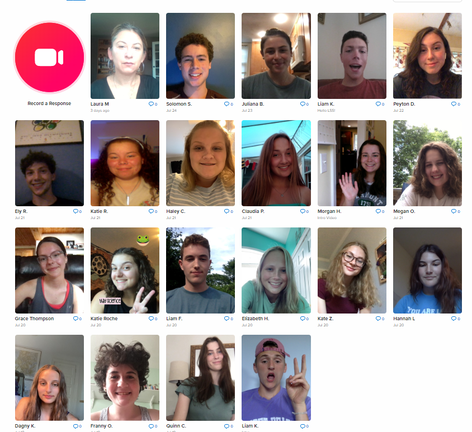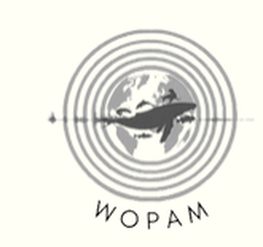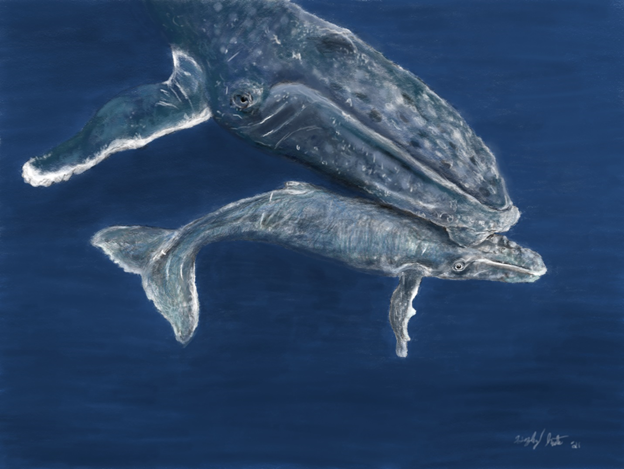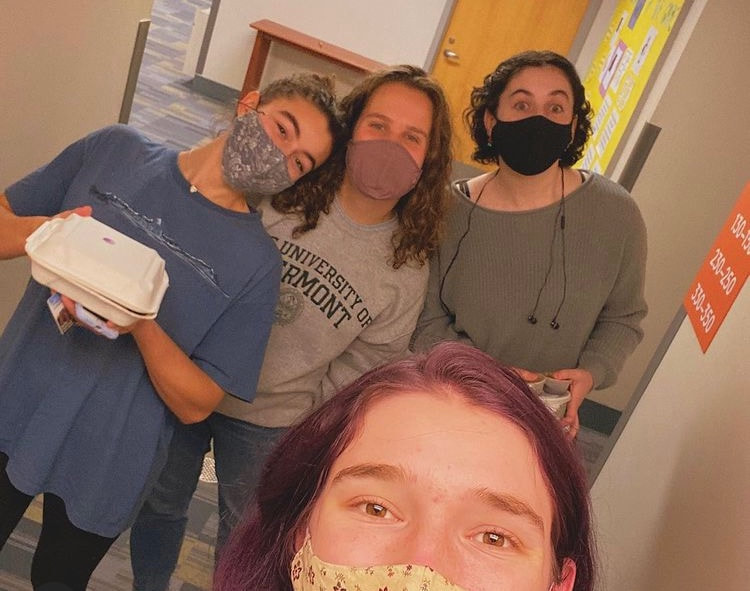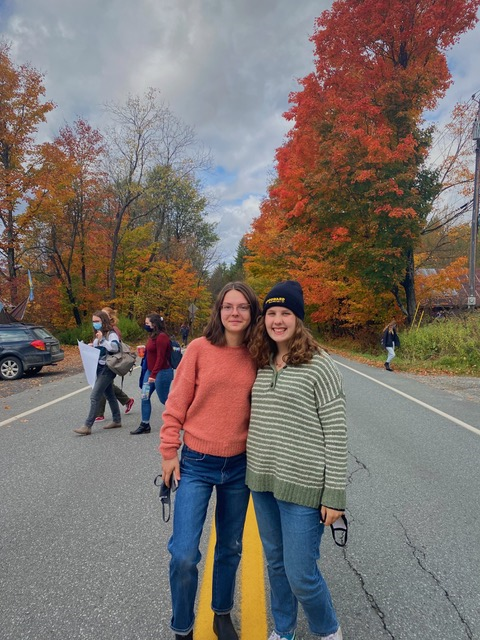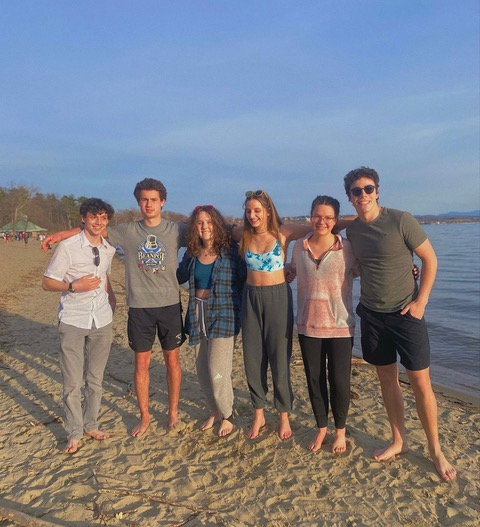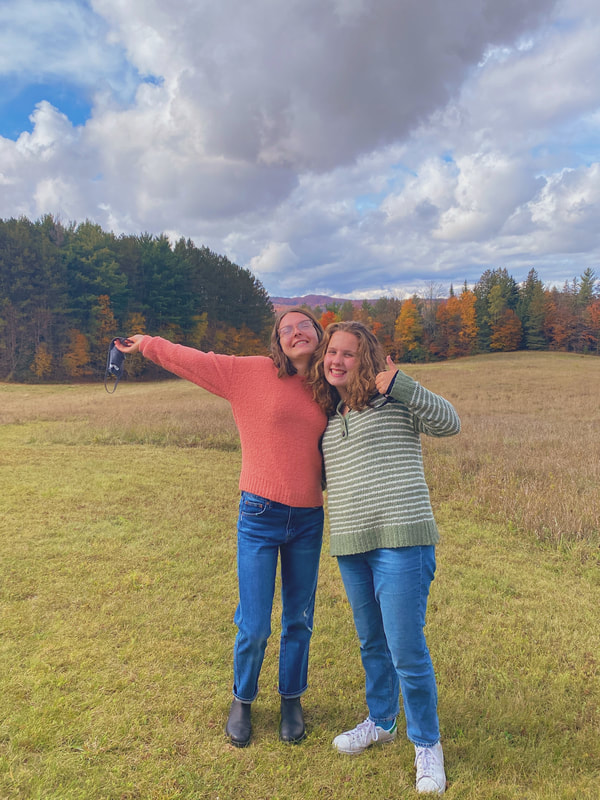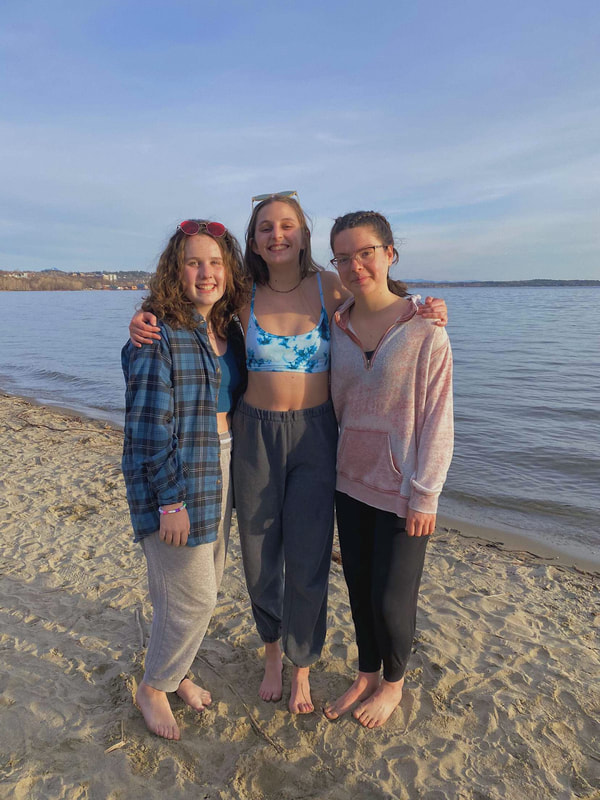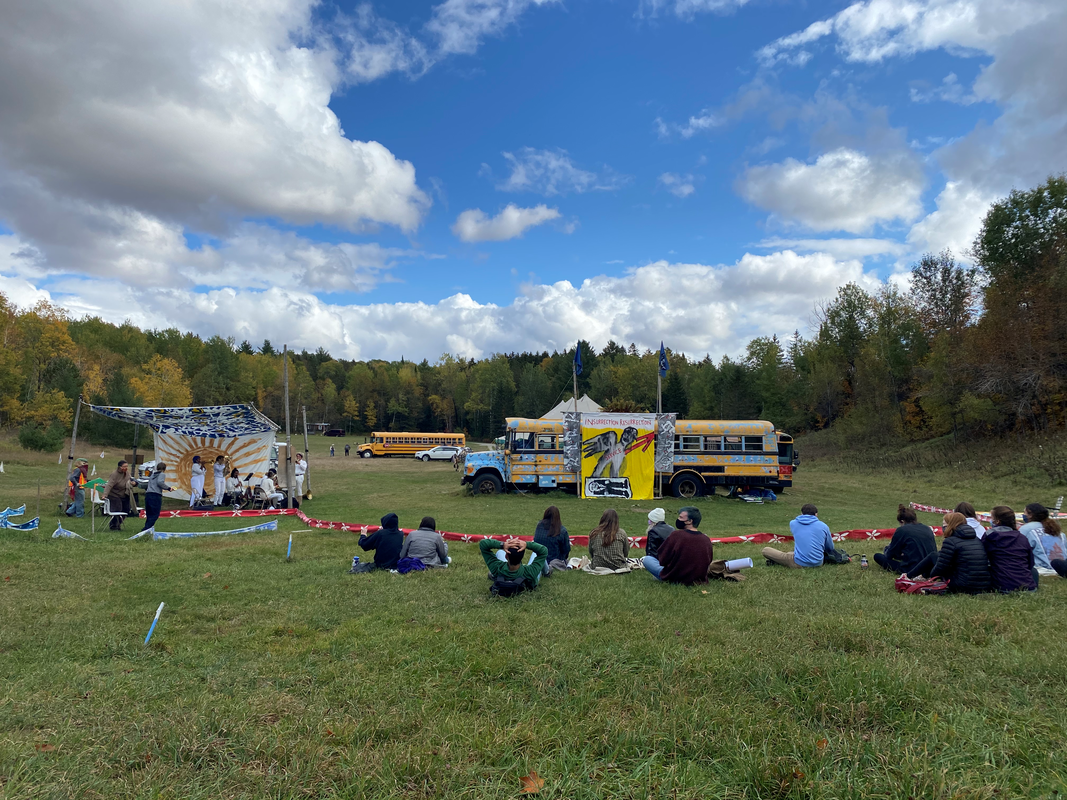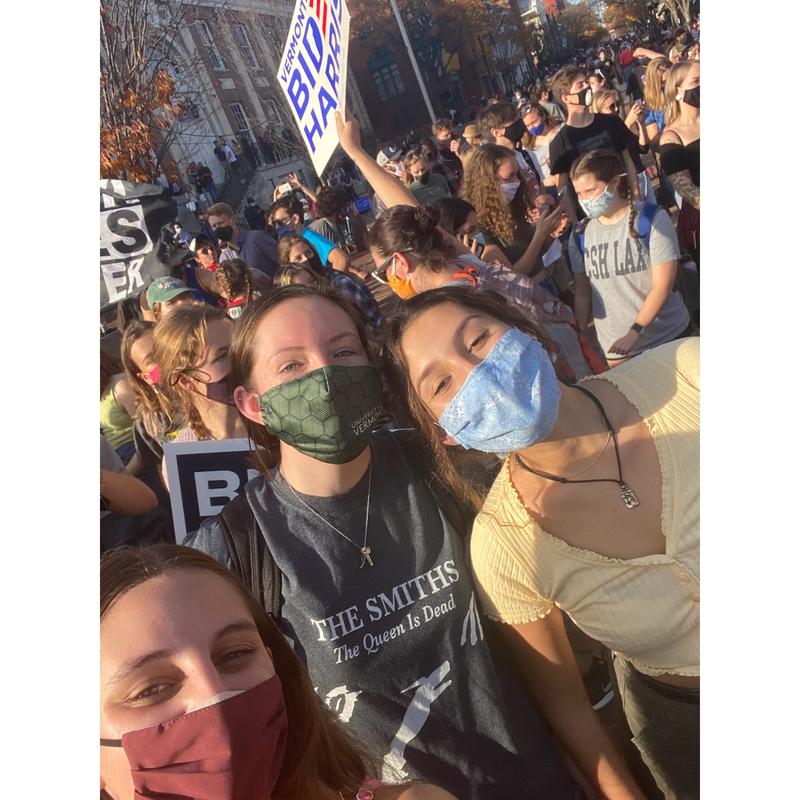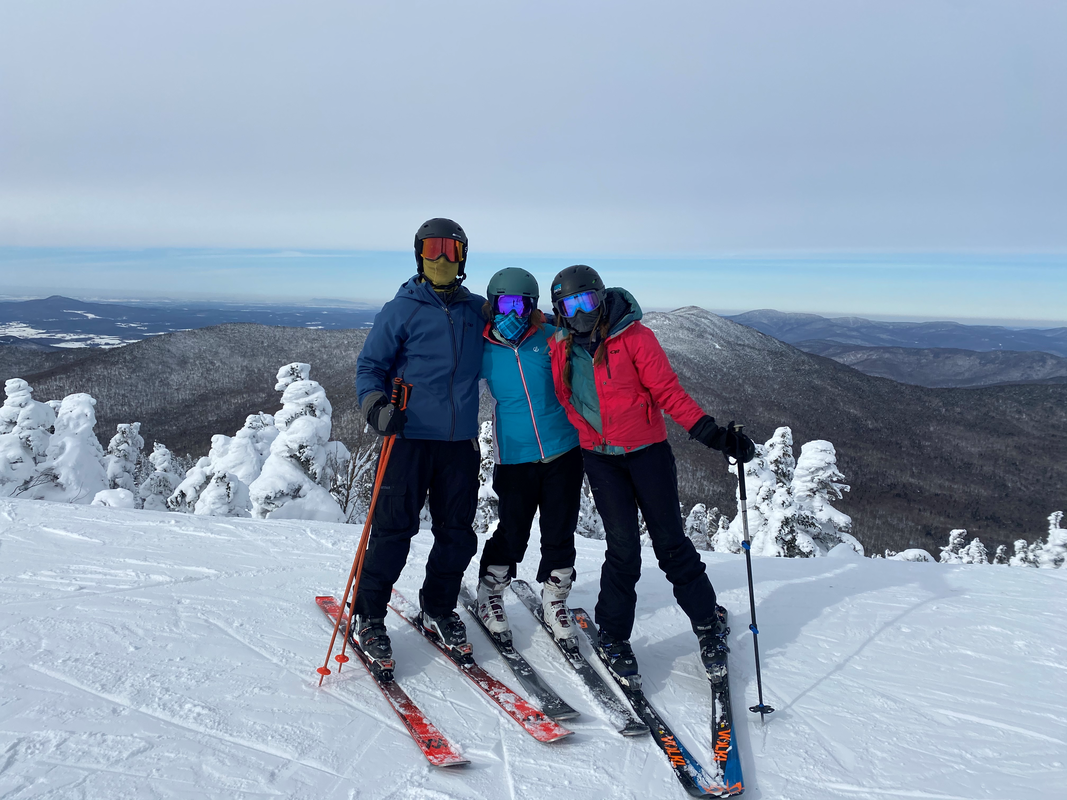LSS Generation 2020-2021
CURE-LSS Book
Lizzie Hynes "Overall, the LSS program provided me with numerous opportunities and allowed me to engage with a like-minded group of students interested in science. This experience altered my freshman year by allowing me to live and learn with people who are driven and taking similar course work than I am. By taking the Nobel Prize Winning scientist and LSS cure lab classes, I significantly grew as a student. Both the professors and peers made this a educational and memorable experience!"
Julia Murray "My experience in the LSS program was super amazing! The LSS CURE research was super interesting and it was something that I have never done before so it was a great new experience! Professor May-Collado was so inspiring throughout this entire experience and so helpful through the whole LSS CURE experience. I loved living with some of my best friends and making new life long bonds with people. Thank you so much for everything this year!"
Claudia Pollock "This year I learned a lot about science in the LSS program. This program allowed me to fully immerse myself in the life sciences like I never had before. I especially enjoyed the seminar series with Prof. Brian Balif where we learned about different Nobel Prize winners in the field of biology. I also enjoyed doing research under Prof. Laura May-Collado with my other classmates and learning about marine biology. I am very grateful for the many influential experiences I had in the LSS program and it really helped me narrow down what I want to pursue in the field of the life sciences."
Ely Remes "As an incoming freshman, I received an email inviting me to apply to the LASP program. When I first got the invite, I thought to myself, “really? Another essay to write?!” What I didn’t know at the time is that I would meet people like me and some of my closest friends. In our first semester as members of LSS, we took a class on Nobel prize winners. Now I know I know, it doesn’t sound very interesting however, it was by far my favorite class of the semester even though it had little to do with my major. This semester, I performed research for Professor Collado researching the effects of the pandemic on boat travel and how that affected the acoustic levels of whales. Even though at times the research was difficult, I wouldn’t trade it for the world. Outside of the classroom, I lived in a co-ed suite with friends who were also in LSS and by extent, people with either the same or incredibly similar majors to me. This opportunity to live with people and talk with them about the stuff we all loved was truly amazing. Even though we were in a pandemic and unable to do too much with other people, we found ways to hang and get to know the other members of LSS through hanging in common rooms and helping each other out with whichever chem lab we all had to do. So, I have to say overall, I am so thankful I decided to write that essay and join the LSS and get to know all of these amazing people and take advantage of all of these opportunities I wouldn’t have had the chance to have known and taken if I hadn’t joined LSS."
Kate Zoller
I applied for the Liberal Arts Scholars Program in the Life Science Scholars program as a Biology major. When I applied, I was passionate about biology and medical science, but unsure if it was the path for me, unsure of whether I would be smart enough for the rigor of the major and considering changing my major and entering into college undecided. I knew that the LSS program sounded really cool and interesting and like it would provide a lot of opportunities that I wouldn’t get anywhere else. I was especially excited about taking Professor Ballif’s class on science experiments and research studies that had won Nobel Prizes, living with like-minded people, and having my first scientific research experience in the LSS CURE Lab Course with Professor May-Collado.
To say that the program was a good experience for me would be an understatement. I found myself as a scientist and as a person in the LSS program. I transformed from someone who was unsure about majoring in the Life Sciences into someone who now feels that I could not have majored in anything but Biology. I feel confident in writing a lab report, and a scientific research paper from the skills and knowledge I gained in Professor Ballif’s Nobel Prize Winning Science TAP class. This class is definitely one of the experiences from the LSS program that I feel like I got the most out of. I really enjoyed learning about the different Nobel Prize winning studies, as well as Professor Ballif’s own research and then writing a research article on a Nobel Prize winner that I was most interested about. I chose to write my research paper on the development of the Yellow Fever vaccine. Vaccines and the immune system is something that I am very interested in, so it was a great experience learning about the development of a vaccine, especially one that while developed in the 1930’s by Max Theiler and his colleagues, is still used today.
I also found that Professor May-Collado’s LSS CURE Lab was an experience that I got a lot out of. Being able to work with Professor May-Collado’s data and research project was a privilege and a big responsibility. I am so grateful that I was given the opportunity to create and conduct and research project of my own. I enjoyed working with my group to do this and found that my ability to work in group on a project was significantly improved by the experience. I found that while marine soundscapes is not my area of passion, the experience was still infinitely valuable to me. The challenging nature of the course was stressful, overwhelming, and frustrating at times, but was worth it. The rigor intimidated me, but I grew so much as a person and as a scientist because of it. I am now going through the process of getting involved in research here at UVM and having the LSS CURE course as prior experience makes me feel more prepared and more qualified for research that I am currently pursuing.
I am very thankful for this opportunity and for the experience, knowledge, work ethic, and personal development, as well as friendships and relationships with professors and colleagues, gained from this course as well as the LSS LASP program as a whole. The program was challenging but I learned so much from it and am now a better student and scientist because of it. I now consider myself to be a scientist in a way that I have never considered myself to be. I am proud of the work that I’ve done, the time that I have spent doing that work, and what I have produced. I think that I have emerged from my first year at college as a harder worker, more diligent, and more experienced within the field of biology and research.
I applied for the Liberal Arts Scholars Program in the Life Science Scholars program as a Biology major. When I applied, I was passionate about biology and medical science, but unsure if it was the path for me, unsure of whether I would be smart enough for the rigor of the major and considering changing my major and entering into college undecided. I knew that the LSS program sounded really cool and interesting and like it would provide a lot of opportunities that I wouldn’t get anywhere else. I was especially excited about taking Professor Ballif’s class on science experiments and research studies that had won Nobel Prizes, living with like-minded people, and having my first scientific research experience in the LSS CURE Lab Course with Professor May-Collado.
To say that the program was a good experience for me would be an understatement. I found myself as a scientist and as a person in the LSS program. I transformed from someone who was unsure about majoring in the Life Sciences into someone who now feels that I could not have majored in anything but Biology. I feel confident in writing a lab report, and a scientific research paper from the skills and knowledge I gained in Professor Ballif’s Nobel Prize Winning Science TAP class. This class is definitely one of the experiences from the LSS program that I feel like I got the most out of. I really enjoyed learning about the different Nobel Prize winning studies, as well as Professor Ballif’s own research and then writing a research article on a Nobel Prize winner that I was most interested about. I chose to write my research paper on the development of the Yellow Fever vaccine. Vaccines and the immune system is something that I am very interested in, so it was a great experience learning about the development of a vaccine, especially one that while developed in the 1930’s by Max Theiler and his colleagues, is still used today.
I also found that Professor May-Collado’s LSS CURE Lab was an experience that I got a lot out of. Being able to work with Professor May-Collado’s data and research project was a privilege and a big responsibility. I am so grateful that I was given the opportunity to create and conduct and research project of my own. I enjoyed working with my group to do this and found that my ability to work in group on a project was significantly improved by the experience. I found that while marine soundscapes is not my area of passion, the experience was still infinitely valuable to me. The challenging nature of the course was stressful, overwhelming, and frustrating at times, but was worth it. The rigor intimidated me, but I grew so much as a person and as a scientist because of it. I am now going through the process of getting involved in research here at UVM and having the LSS CURE course as prior experience makes me feel more prepared and more qualified for research that I am currently pursuing.
I am very thankful for this opportunity and for the experience, knowledge, work ethic, and personal development, as well as friendships and relationships with professors and colleagues, gained from this course as well as the LSS LASP program as a whole. The program was challenging but I learned so much from it and am now a better student and scientist because of it. I now consider myself to be a scientist in a way that I have never considered myself to be. I am proud of the work that I’ve done, the time that I have spent doing that work, and what I have produced. I think that I have emerged from my first year at college as a harder worker, more diligent, and more experienced within the field of biology and research.
Hayley Norton "Tell me about your experience overall in the LSS program, your favorite moments, courses, please share photos with your friends, and your overall experience with your research project. These blogs are shared with future LSS students, helping them make a decision whether to apply or not to this program. Overall, even with the limited circumstances of COVID this program has been a big factor in my personal growth. From having to develop my own research papers in bailiffs’ class (that have now helped me through other classes research papers), to working on research with my group on the CURE side of things. Overall, I would say that, as an animal science major who fought her way into the program, I would say I am glad I fought because this program has been a major factor in my personal growth as a student and as a member of society. From working on public speaking to writing this program has developed it all into something that will last all through my college career here at UVM and beyond to when I get into veterinary school. I feel in the future that this program should be offered to all asci majors as well, especially those who are wishing to pursue veterinary school because of the great team of advisors and researchers willing to push you to succeed"
Quinn Chapman
As a first-year student in the life sciences, I can say with confidence that having a group of people who you can lean on is incredibly valuable. For me the Liberal Arts Scholars Program (LASP), more specifically the Life Science Scholars (LSS), served as that support group. Through the LSS program this network of amazing people consisted of Dr. Brian Ballif, Dr. Laura May-Collado as well as 18 of my other LSS peers.
Dr. Ballif was my professor for Nobel Prize Winners, which is a course all LSS students have the opportunity to take. Additionally, Dr. Ballif served as one of my advisors. Dr. Ballif truly exceeded my expectations as a professor and advisor. As a somewhat of a shy student, I was surprised by not only how approachable, but also how patient he was with his students. Twice a week my LSS peers and I attended class with Dr. Ballif to discuss the groundbreaking work of different Nobel Laureates in the scientific field. Dr. Ballif’s excitement about the topics we covered was infectious and only furthered my intrigue in the life sciences. Frequently, after class my roommate and I would stay a few minutes after class to pick Dr. Ballif’s brain about the Laureate’s work we covered that day, and he was always happy to appease our curiosity. One of my favorite aspects of this course was the research we did over the course of the semester on a chosen Nobel Laureate. As I have a real interest in forensic science, I chose to examine Kary B. Mullis and the events that led him to create polymerase chain reaction (PCR). My classmates and I were able to convey our findings through two different formats: a presentation and a research paper. While I had done plenty of presentations in high school, I had never written an official research paper. However, Dr. Ballif made an overwhelming process much less daunting. I honestly cannot not say enough positive things about this course and its faculty.
Kicking off the spring semester I was enrolled in a second course offered especially for LSS students taught by Dr. Laura May-Collado who, like Dr. Ballif, also served as one of my advisors. This course, LSS Course Based Undergraduate Research Experience (CURE), felt like a complete 180 from Dr. Ballif’s course in the sense of its emphasis on independence. However, LSS CURE’s value as a course is immeasurable. I learned how to, within a group, apply the scientific method from start to finish as well as communicate my findings to a broader audience in an effective way. All of this was made possible by Dr. May-Collado who pushed my LSS Peers and I in a rigorous but ultimately rewarding way that I am grateful for. Dr. May-Collado’s course taught me several valuable lessons. However, the one that sticks out to me the most is that I learned how to evolve with my research when things don’t go as planned.
Aside from the astounding faculty I was able to work with throughout the course of the year, I was also able to engage with an amazing group of students who shared the same passion for science as I do. My LSS peers truly made this year an unforgettable experience. As we were all more or less in the same classes, we were able to collaborate and support one another throughout the course of the year. I would highly recommend LSS to those first years who are looking to get a more realistic understanding of what lies ahead for them not only as a life science major, but as a member of the scientific community.
As a first-year student in the life sciences, I can say with confidence that having a group of people who you can lean on is incredibly valuable. For me the Liberal Arts Scholars Program (LASP), more specifically the Life Science Scholars (LSS), served as that support group. Through the LSS program this network of amazing people consisted of Dr. Brian Ballif, Dr. Laura May-Collado as well as 18 of my other LSS peers.
Dr. Ballif was my professor for Nobel Prize Winners, which is a course all LSS students have the opportunity to take. Additionally, Dr. Ballif served as one of my advisors. Dr. Ballif truly exceeded my expectations as a professor and advisor. As a somewhat of a shy student, I was surprised by not only how approachable, but also how patient he was with his students. Twice a week my LSS peers and I attended class with Dr. Ballif to discuss the groundbreaking work of different Nobel Laureates in the scientific field. Dr. Ballif’s excitement about the topics we covered was infectious and only furthered my intrigue in the life sciences. Frequently, after class my roommate and I would stay a few minutes after class to pick Dr. Ballif’s brain about the Laureate’s work we covered that day, and he was always happy to appease our curiosity. One of my favorite aspects of this course was the research we did over the course of the semester on a chosen Nobel Laureate. As I have a real interest in forensic science, I chose to examine Kary B. Mullis and the events that led him to create polymerase chain reaction (PCR). My classmates and I were able to convey our findings through two different formats: a presentation and a research paper. While I had done plenty of presentations in high school, I had never written an official research paper. However, Dr. Ballif made an overwhelming process much less daunting. I honestly cannot not say enough positive things about this course and its faculty.
Kicking off the spring semester I was enrolled in a second course offered especially for LSS students taught by Dr. Laura May-Collado who, like Dr. Ballif, also served as one of my advisors. This course, LSS Course Based Undergraduate Research Experience (CURE), felt like a complete 180 from Dr. Ballif’s course in the sense of its emphasis on independence. However, LSS CURE’s value as a course is immeasurable. I learned how to, within a group, apply the scientific method from start to finish as well as communicate my findings to a broader audience in an effective way. All of this was made possible by Dr. May-Collado who pushed my LSS Peers and I in a rigorous but ultimately rewarding way that I am grateful for. Dr. May-Collado’s course taught me several valuable lessons. However, the one that sticks out to me the most is that I learned how to evolve with my research when things don’t go as planned.
Aside from the astounding faculty I was able to work with throughout the course of the year, I was also able to engage with an amazing group of students who shared the same passion for science as I do. My LSS peers truly made this year an unforgettable experience. As we were all more or less in the same classes, we were able to collaborate and support one another throughout the course of the year. I would highly recommend LSS to those first years who are looking to get a more realistic understanding of what lies ahead for them not only as a life science major, but as a member of the scientific community.
Hannah Larose
"Once I committed to go to UVM, I almost immediately decided I wanted to enter the Liberal Arts Scholars Program (LASP) for Life Science. As a biology major, I was intrigued by the science classes offered specifically to LSS LASP students, and I thought that the small class size and close dynamic that I could create with my LSS peers would be perfect. Once I entered LASP in the fall, I knew I had made the right choice. All LASP students live in the Living and Learning dorms on Athletic Campus, which is right in the middle of UVM, and is the ideal place to be. In L/L most of the LSS students lived on the same floor and shared suites, so it was easy to become friends with everyone in the program. Living in a suite is one of the best housing choices at UVM, and you are able to get super close with your suitemates and have a fun living environment. During my first semester of LASP, everyone takes almost all the same classes, including biology, chemistry, calculus. This makes it really easy to study together and help each other study for every exam. Also, during the first semester, all LSS students take Nobel Prize Winner’s with Dr. Bryan Ballif. Dr. Ballif is an awesome professor, and his class taught me about so many important discoveries made in science, as well as how to write the perfect lab report for college. After the first semester, we got a little more freedom with our schedules, and got to pick our own classes. Most of us took the next sequence of biology, chemistry, or calculus. But we also got to add a distribution requirement or two, as well as take Dr. Laura May-Collado’s LSS CURE lab course. In the CURE lab, we all did research on marine soundscapes, which Dr. May-Collado specializes in. I did my research on humpback whale activity in Coiba Contreras, Panama, along with two of my peers from LSS. During the time I spent in this course I established invaluable collaboration skills, and well as developed a new enthusiasm for research. I hope to use what I learned in Dr. May-Collado’s lab to further my career in science, and make science a more digestible topic for others. Overall, I really enjoyed my time in LASP, and I encourage anyone thinking about applying to do so."
"Once I committed to go to UVM, I almost immediately decided I wanted to enter the Liberal Arts Scholars Program (LASP) for Life Science. As a biology major, I was intrigued by the science classes offered specifically to LSS LASP students, and I thought that the small class size and close dynamic that I could create with my LSS peers would be perfect. Once I entered LASP in the fall, I knew I had made the right choice. All LASP students live in the Living and Learning dorms on Athletic Campus, which is right in the middle of UVM, and is the ideal place to be. In L/L most of the LSS students lived on the same floor and shared suites, so it was easy to become friends with everyone in the program. Living in a suite is one of the best housing choices at UVM, and you are able to get super close with your suitemates and have a fun living environment. During my first semester of LASP, everyone takes almost all the same classes, including biology, chemistry, calculus. This makes it really easy to study together and help each other study for every exam. Also, during the first semester, all LSS students take Nobel Prize Winner’s with Dr. Bryan Ballif. Dr. Ballif is an awesome professor, and his class taught me about so many important discoveries made in science, as well as how to write the perfect lab report for college. After the first semester, we got a little more freedom with our schedules, and got to pick our own classes. Most of us took the next sequence of biology, chemistry, or calculus. But we also got to add a distribution requirement or two, as well as take Dr. Laura May-Collado’s LSS CURE lab course. In the CURE lab, we all did research on marine soundscapes, which Dr. May-Collado specializes in. I did my research on humpback whale activity in Coiba Contreras, Panama, along with two of my peers from LSS. During the time I spent in this course I established invaluable collaboration skills, and well as developed a new enthusiasm for research. I hope to use what I learned in Dr. May-Collado’s lab to further my career in science, and make science a more digestible topic for others. Overall, I really enjoyed my time in LASP, and I encourage anyone thinking about applying to do so."
Liam Kelliher
Hi everyone! My name is Liam Kelliher, and I was a member of the Life Science Scholars program at UVM. I had such a wonderful time being a part of this community, as it has aided so significantly in the transition from completing high school to beginning my undergraduate education. LSS provides academically focused students with a program that allows them to demonstrate their passion in regard to the life sciences, and I cannot be happier that I chose to undergo this journey with my peers.
LSS begins with a class about Nobel Prize Winners with Doctor Ballif. Doctor Ballif is a fantastic professor and is so knowledgeable about the life sciences (particularly in regard to research). I absolutely loved this class, because it allowed me to connect things that I was learning about in my general education biology and chemistry classes with groundbreaking research that was taking place in the real world.
In the second semester, LSS students take part in a CURE class taught by Doctor Laura May-Collado, who is actually the head of the LSS program. In this course, students are asked to undertake significant research projects in regard to the acoustics and marine ecosystems. While it may seem daunting at first, Doctor May-Collado’s approach to undergraduate research allows for students to excel in this class, and truly enjoy learning about the process of conducting scientific research. Doctor May-Collado is incredibly passionate about her research, which makes it even more exciting for students who are under her tutelage.
Doctor Ballif and Doctor May-Collado only want the best for their LSS students and provide them with an avenue for success in a historically difficult undergraduate education (life sciences). Not only do they both aid in the transition from high school to college, but they also open up doors for undergraduate research. The best thing about being in LSS is the sense of community between the students and the professors, as we all want each other to succeed and become the new faces of modern science.
Hi everyone! My name is Liam Kelliher, and I was a member of the Life Science Scholars program at UVM. I had such a wonderful time being a part of this community, as it has aided so significantly in the transition from completing high school to beginning my undergraduate education. LSS provides academically focused students with a program that allows them to demonstrate their passion in regard to the life sciences, and I cannot be happier that I chose to undergo this journey with my peers.
LSS begins with a class about Nobel Prize Winners with Doctor Ballif. Doctor Ballif is a fantastic professor and is so knowledgeable about the life sciences (particularly in regard to research). I absolutely loved this class, because it allowed me to connect things that I was learning about in my general education biology and chemistry classes with groundbreaking research that was taking place in the real world.
In the second semester, LSS students take part in a CURE class taught by Doctor Laura May-Collado, who is actually the head of the LSS program. In this course, students are asked to undertake significant research projects in regard to the acoustics and marine ecosystems. While it may seem daunting at first, Doctor May-Collado’s approach to undergraduate research allows for students to excel in this class, and truly enjoy learning about the process of conducting scientific research. Doctor May-Collado is incredibly passionate about her research, which makes it even more exciting for students who are under her tutelage.
Doctor Ballif and Doctor May-Collado only want the best for their LSS students and provide them with an avenue for success in a historically difficult undergraduate education (life sciences). Not only do they both aid in the transition from high school to college, but they also open up doors for undergraduate research. The best thing about being in LSS is the sense of community between the students and the professors, as we all want each other to succeed and become the new faces of modern science.
Franny Oppenheimer "My experience in LSS Cure has definitely been net positive. There were some rough patches - meeting remotely is not everyone’s cup of tea, and it can be hard to coordinate a semester-long project through microsoft teams - but in the end my group had a piece of work that I am extremely proud of. One of the best parts of the course and the program for me was the sense of community it created. It’s been very hard to feel anything but isolated during this pandemic year, but being able to gather in a room with a small group of our peers, asking each other questions and laughing with each other, celebrating ourselves and the work we’ve done felt really special. This course has given me a sense of the realities of working in the research field (which have not driven me away - I’m taking that as a good sign!), and connections to a group of motivated and hard-working students. It’s been a hard year and a hard semester, but I’m so glad to have gone through it. The people I’ve met through the program and the experiences we’ve shared have become absolutely invaluable to me!"
Juliana Bouchard "My overall experience in the LSS program has been great! The LSS program has given me many opportunities at the University of Vermont including being a part of the LSS cure lab under Prof. May-Collado, as well as taking the Nobel Prize Winners seminar with Prof. Ballif. The LSS program has also given me the unique opportunity to live and learn with people who share the same interests in science as me. LSS has not only challenged me, but also helped me grow as a student and has prepared me for the years to come! I am very thankful to have been a part of this program!"
Grace Thompson “I am very thankful for my experience in the LSS program. Being able to work alongside other students with similar interests and passions was very helpful when interacting with new concepts. We all offered different ideas, however, which made our conversations and discussions super interactive and, in some cases, ongoing. Throughout this year, I learned so much about myself in terms of my future goals and desired explorations. Both Professor Ballif and Professor May-Collado offered us guidance with this by incorporating diverse topics, as well as topics that related to their areas of expertise, into their lesson plans. Simultaneously, we were encouraged to be independent thinkers and problem solvers. I think the most memorable moments for me included being praised for my questions (because I have a lot of them) and then exploring those questions further with current research. Also, our summer reading, Evolution for Everyone by Dr. David Sloan Wilson, will remain with me, hopefully, throughout my career in science. I love this book and the important insight it provides. Overall, I am so glad that I chose to apply to this program because the friendships I have made I know will last throughout my time at UVM or even my life.”
Sol Snuggerud "My time in the LSS program was very fun, I really enjoyed being a part of a suite and sharing pretty much the same course load as my friends. The research project was engaging and interesting and gave you a peak at what life as a researcher could be like. Overall my time in the LSS program was fantastic and I would recommend any incoming freshman to apply."
Megan O'Connor The day I toured UVM happened to be the same day as the UVM Undergraduate Research Conference, so I was able to walk around looking at projects that students had been working on for the whole year. I stopped and talked to 3 girls for about a half an hour about their project on humpback whales and their experience in the LASP program. It was then that I decided I wanted to be in this program, and I am so incredibly happy I applied.
LSS gave me a sense of community before I even stepped on campus, and continued to do so as I navigated my first two semesters of college during an extremely eventful year. My fall class with Professor Ballif on Nobel Prizewinners helped me become more confident in reading and writing about science, and it was amazing to get to know Professor Ballif. He was always available to talk about his work, the work of the laureates we spoke about in class, or just the process of finding undergraduate research and planning our college careers! I'm taking a genetics class with him over the summer and I'm super excited. This past semester we had the opportunity to dive right into research with Professor May-Collado! My group investigated the effects of the lunar cycle on humpback whale activity, which we presented at the same conference I had visited two years earlier! It was a very independent, challenging, student driven class that let you know right away what being a research scientist is like. As someone extremely interested in marine biology this was the perfect class for me. I highly encourage any new student to apply for LSS, I have made incredible friends and become a more confident student over the past year than I ever thought I would my first year of college. I'm glad I had a great group of classmates and professors who pushed me to succeed.
LSS gave me a sense of community before I even stepped on campus, and continued to do so as I navigated my first two semesters of college during an extremely eventful year. My fall class with Professor Ballif on Nobel Prizewinners helped me become more confident in reading and writing about science, and it was amazing to get to know Professor Ballif. He was always available to talk about his work, the work of the laureates we spoke about in class, or just the process of finding undergraduate research and planning our college careers! I'm taking a genetics class with him over the summer and I'm super excited. This past semester we had the opportunity to dive right into research with Professor May-Collado! My group investigated the effects of the lunar cycle on humpback whale activity, which we presented at the same conference I had visited two years earlier! It was a very independent, challenging, student driven class that let you know right away what being a research scientist is like. As someone extremely interested in marine biology this was the perfect class for me. I highly encourage any new student to apply for LSS, I have made incredible friends and become a more confident student over the past year than I ever thought I would my first year of college. I'm glad I had a great group of classmates and professors who pushed me to succeed.
Katie Roberts "I applied for the LSS LASP program because it sounded like a great experience to get in touch the biology program here at UVM. However, what It brought me is a lifetime of experiences I would have never gotten my freshman year anywhere else. Fall semester, the other LSS students and I took a course taught by Dr. Brian Ballif called “Nobel Prize winning science” which allowed me to learn about award winning scientists that were not just in Biology or Health sciences field, which is what I was most interested in. Spring semester, my fellow classmates and I also took a course called CURE overseen by Dr. Laura May-Collado that allowed us to conduct our own research within the topics of biological science based on marine soundscapes. Not only has this program brought me multiple opportunities to push myself and take rigorous courses it has also allowed me to meet new people and professors that helped me build a diverse background in biological sciences. Although, our freshman year at UVM was pretty unconventional due to COVID the LASP LSS program has allowed me to learn in a fun environment which also pushed me to become a better student at UVM."
Dagny Keltner Last spring, in the middle of trying to choose between many different schools I wasn’t able to visit because of the pandemic, I received an email from UVM asking me to apply to LASP. Before this, I had never even heard of the program and was expecting just to join the honors college instead. Before applying, I was really worried about coming to UVM. UVM was the largest school I applied to and, being from the west coast, it was about as far from home as I could get. After getting accepted to LASP as a biochem major I received an email telling me that I couldn’t be a biochem major in the program. Instead of dropping out, I switched my major to biological sciences so I could stay. This was one of the best decisions I have ever made. When I arrived on campus in the fall, I didn’t know a single person in the state of Vermont, let alone at UVM, I’d never even been to the east coast. I was so scared that I wouldn’t find my people here. Turns out, I had no reason to be afraid.
During my week in quarantine before class started, I watched the videos everyone had uploaded for our biology class in LASP over and over again. When my suite mates showed up on the first day, I knew that I had found my people. Because of COVID it has been really hard to meet people and being able to live with the five people I can now call my closest friends had been life-changing. I always have someone to go get food, finish a chem lab or go to the beach with. Academically, LASP has challenged me allowed me to grow as a learner and a critical thinker. First semester, Professor Ballif’s Nobel peace prize class taught be how to write scientifically which is a skill I will take with me into the rest of my education here at UVM and in the real world of science. One thing I really loved about this class is that it was very small and so I was able to participate in class which is how I learn best. This semester, in Laura’s CURE lab, I have had one of the most positive group-work experiences of my life. In middle school and high school I always dreaded group projects because I never felt like my peers were engaged. My experience with my friends in LASP was completely different, everyone was committed to the project and put in equal effort.
Some of my favorite experiences from this year in LASP include out field trip to bread and puppet, birthday parties with my suite and getting to know people in other LASP groups. Next year I am joining the Honors College through automatic admission from the LASP program. I am going to miss LASP but I know that the experiences I had this year and the people I met will continue with me for the rest of my time here. If you have a chance to apply to LASP, I highly recommend it. You will not regret it (also, we get the best housing on campus).
During my week in quarantine before class started, I watched the videos everyone had uploaded for our biology class in LASP over and over again. When my suite mates showed up on the first day, I knew that I had found my people. Because of COVID it has been really hard to meet people and being able to live with the five people I can now call my closest friends had been life-changing. I always have someone to go get food, finish a chem lab or go to the beach with. Academically, LASP has challenged me allowed me to grow as a learner and a critical thinker. First semester, Professor Ballif’s Nobel peace prize class taught be how to write scientifically which is a skill I will take with me into the rest of my education here at UVM and in the real world of science. One thing I really loved about this class is that it was very small and so I was able to participate in class which is how I learn best. This semester, in Laura’s CURE lab, I have had one of the most positive group-work experiences of my life. In middle school and high school I always dreaded group projects because I never felt like my peers were engaged. My experience with my friends in LASP was completely different, everyone was committed to the project and put in equal effort.
Some of my favorite experiences from this year in LASP include out field trip to bread and puppet, birthday parties with my suite and getting to know people in other LASP groups. Next year I am joining the Honors College through automatic admission from the LASP program. I am going to miss LASP but I know that the experiences I had this year and the people I met will continue with me for the rest of my time here. If you have a chance to apply to LASP, I highly recommend it. You will not regret it (also, we get the best housing on campus).
